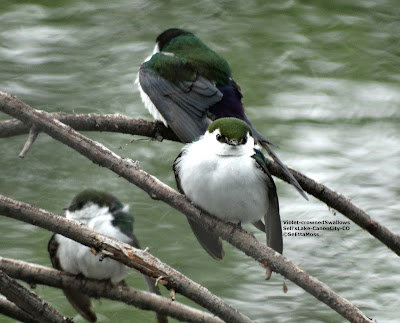
I believe it had field marks consistent with a juvenile "American" (F.p. anatum) Peregrine Falcon described in detail in Brian Wheeler's Raptors of Western North America (p. 474--not the 'lightly marked type').

Field marks consistent with this subspecies that are evident in these pics include: a 'wide type' malar mark that blends with it's dark cap; a dark forehead with a "narrow tawny patch"; nape is a mix of dark coloration and some pale patches; it has tawny auriculars; the ventral part of it's body is "rufous-tawny with moderately wiede dark brown streaking on the breast, belly and lower belly"; the flanks I could see well are streaked; the leg feathers are tawny with pretty wide markings (Wheeler says "streaking" but that isn't clear in my pics); the dorsal portion of the wings are dark brown and there are tawny colored edging on the coverts; the ventral portion of the remiges are dark with pretty wide rufous bars while the coverts are tawny with brown barring;

Of course this is the subspecies to be expected here as Wheeler notes that the "American" (anatum) subspecies were the birds released in the reintroductions in the western U.S.

But I think it's pretty neat that the field marks visible in these pics do match those for the expected subspecies. And most of these pics are sharp enough that they will enlarge into nice close-ups--just double click on each pic. SeEtta

 I believe it had field marks consistent with a juvenile "American" (F.p. anatum) Peregrine Falcon described in detail in Brian Wheeler's Raptors of Western North America (p. 474--not the 'lightly marked type').
I believe it had field marks consistent with a juvenile "American" (F.p. anatum) Peregrine Falcon described in detail in Brian Wheeler's Raptors of Western North America (p. 474--not the 'lightly marked type'). Field marks consistent with this subspecies that are evident in these pics include: a 'wide type' malar mark that blends with it's dark cap; a dark forehead with a "narrow tawny patch"; nape is a mix of dark coloration and some pale patches; it has tawny auriculars; the ventral part of it's body is "rufous-tawny with moderately wiede dark brown streaking on the breast, belly and lower belly"; the flanks I could see well are streaked; the leg feathers are tawny with pretty wide markings (Wheeler says "streaking" but that isn't clear in my pics); the dorsal portion of the wings are dark brown and there are tawny colored edging on the coverts; the ventral portion of the remiges are dark with pretty wide rufous bars while the coverts are tawny with brown barring;
Field marks consistent with this subspecies that are evident in these pics include: a 'wide type' malar mark that blends with it's dark cap; a dark forehead with a "narrow tawny patch"; nape is a mix of dark coloration and some pale patches; it has tawny auriculars; the ventral part of it's body is "rufous-tawny with moderately wiede dark brown streaking on the breast, belly and lower belly"; the flanks I could see well are streaked; the leg feathers are tawny with pretty wide markings (Wheeler says "streaking" but that isn't clear in my pics); the dorsal portion of the wings are dark brown and there are tawny colored edging on the coverts; the ventral portion of the remiges are dark with pretty wide rufous bars while the coverts are tawny with brown barring;  Of course this is the subspecies to be expected here as Wheeler notes that the "American" (anatum) subspecies were the birds released in the reintroductions in the western U.S.
Of course this is the subspecies to be expected here as Wheeler notes that the "American" (anatum) subspecies were the birds released in the reintroductions in the western U.S. But I think it's pretty neat that the field marks visible in these pics do match those for the expected subspecies. And most of these pics are sharp enough that they will enlarge into nice close-ups--just double click on each pic. SeEtta
But I think it's pretty neat that the field marks visible in these pics do match those for the expected subspecies. And most of these pics are sharp enough that they will enlarge into nice close-ups--just double click on each pic. SeEtta


Comments